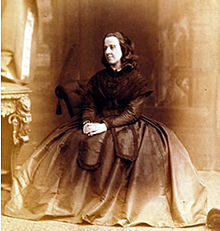Bessie Rayner Parkes
| Bessie Rayner Parkes | |
|---|---|
 |
|
| Born | June 16, 1829 Birmingham, United Kingdom |
| Died | March 23, 1925 Slindon, United Kingdom |
| Resting place | St Richards Catholic Church, Slindon |
Bessie Rayner Parkes Belloc (16 June 1829 - 23 March 1925) was one of the most prominent English feminists and campaigners for women’s rights in Victorian times and also a poet, essayist and journalist.
A great-grandchild of the eminent scientist and Unitarian minister Joseph Priestley (1733-1804), Bessie Rayner Parkes was born to loving, well-off parents, in a household interested in people and ideas. Her father was Joseph Parkes (1796-1865), a prosperous solicitor and a liberal with Radical sympathies. His support for his daughter’s aspirations was moderate. Bessie's mother, Elizabeth Rayner Priestley (1797-1877), usually called Eliza, was a wife and mother, who always considered herself an American, having been born in Northumberland, Pennsylvania. She remembered her grandfather with admiration and love. Although not in great sympathy with her daughter over her strong wish to make changes in the status of women, she nevertheless loved her dearly and did not actively oppose her. Unusually for girls of her background, Bessie was well educated at a progressive Unitarian boarding school, a period of her life which she enjoyed.
Parkes became gradually aware of the unjust, contradictory, and even absurd situation of women in Great Britain, though there were many differences according to the social class they belonged to. The first endeavour that Parkes and her friend Barbara Leigh Smith Bodichon took on was to try to change the restrictive property laws that applied to married women, seeMarried Women's Property Act 1870.
Parkes was also indignant about the distinction made between "ladies" and "women". "Ladies", that is to say middle-class women, lost social status if they earned money, the only acceptable exceptions being writing, painting, or teaching, which for the most part meant governessing. Due in part to her efforts, by the close of the century, it became acceptable for a middle-class woman to acquire a proper education and train to do paid work. Working-class women had always belonged to the work force, whether they wanted to or not.
...
Wikipedia
